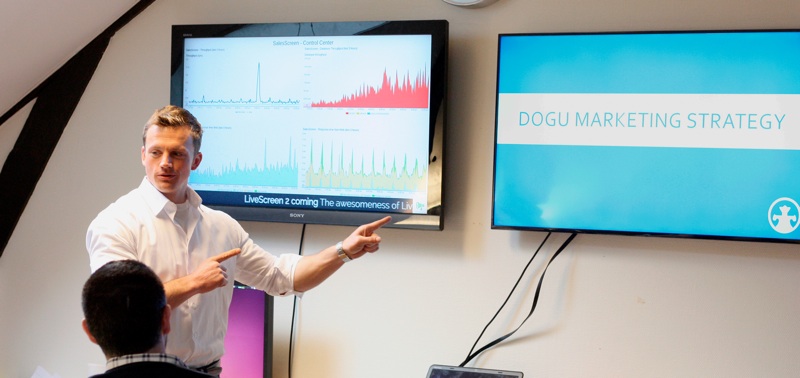
A personal tale of the Norwegian job hunt. An American expat seeks–and finds–a job in Trondheim, Norway.
When I arrived in Trondheim four months ago, I knew that it would be difficult to find work, but I had no idea how difficult.
I hit many failures initially but I quickly learned what works, what doesn’t, and how to maximize time and effort to get interviews.
First, a few hard facts:
- Trondheim is a small city with about 170,000 residents
- It is the definition of a networker city, where meeting people is key to finding employment
- Norwegian is the business language
- A high percentage of the population is very well educated
- They speak a different dialect of Norwegian
- A Master’s degree is almost the standard of education here
- The cost of living is very high
As a U.S. citizen I only had a maximum of six months on my job-seeker visa to receive a full-time offer of employment as a skilled worker, according to the Immigration office UDI. So, there is only one choice: hit the ground running, never stop, and never give up.
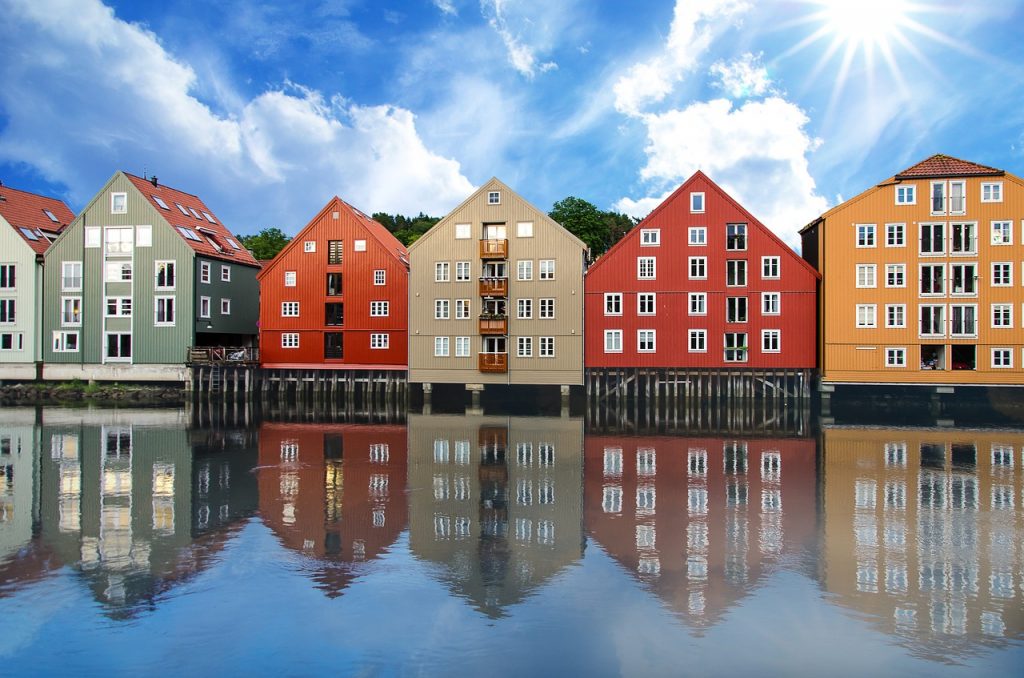
Networking in person
When I arrived, I immediately started seeking opportunities to begin networking, volunteering, and searching for open positions. In my first week, I met with David Nikel at DIGS café. David is a freelance journalist and British expat who has received numerous journalism awards here in Norway.
Read more: Living in Trondheim
He gave me some work writing for a couple of blog sites, which I eagerly took. This site, Life in Norway, which focuses on the experiences of other expats throughout Norway, and also for Technoport, which is a major annual technology conference held in Trondheim.
As an expat, writing blogs is a good way to set yourself apart from the crowd and start building a name for yourself.
I also met a handful of other great people at DIGS and quickly learned that it is a must-visit for anyone new to Trondheim and seeking work.

One of these amazing resources at DIGS was Ingrid Fabrello, who ran a program designed to help expats find work. Ingrid has since authored a book together with David, called How to Find a Job in Norway.
Three top tips
In just one hour, Ingrid gave me three of the most important pieces of information that I learned about job searching in Trondheim:
1. Trondheim is a networker city and you must get to know people here if you hope to find a job.
2. You must apply in person. Searching through Finn is fine for locals with relevant networks and local experience, but it will not be nearly as useful for expats.
You must meet people and let them get to know you. Dress nicely, bring résumé copies, and begin conversation in whatever limited Norwegian you know. Norwegians, like most people, are much more likely to help someone who is willing to help themselves. There is technique to this, which Ingrid teaches in her classes.

3. Always be early. Show up 5 minutes early to any meeting… no more and no less.
The Norwegians are notoriously time-conscious and showing up even a minute after a scheduled meeting is enough reason for the entire interview to be canceled. Never be late in Norway. Never.
DIGS also provides a variety of other entrepreneurship activities, networking opportunities, seminars, meeting events, and other great chances to meet people and learn about open positions.
Learn to adapt your strategy
With limited time to find a job, you must adapt quickly and work extremely hard every day. You honestly must give 100% effort to every opportunity; especially since everyone seems to know everyone else in this city.
Once I realized that Finn.no was not my best chance at getting interviews, I began to do my research and visit the companies in person.
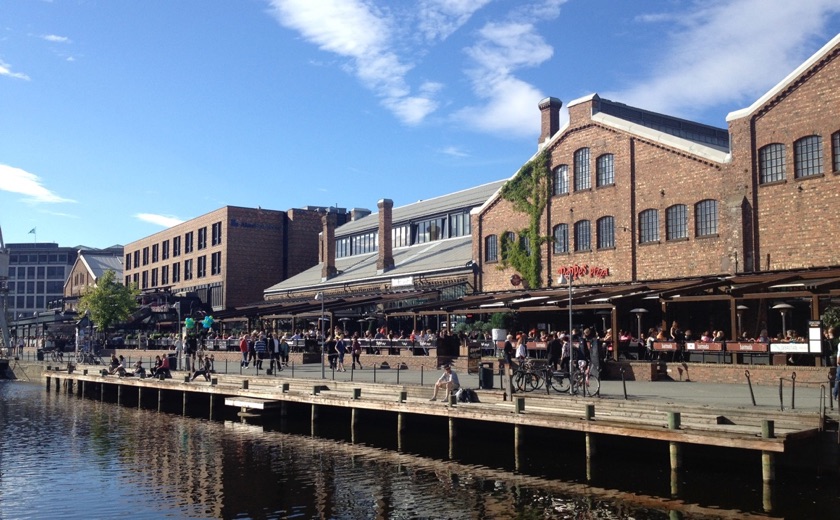
Usually, I would find open positions that seemed relevant on Finn, then come up with a small list of questions, go in person to the office, introduce myself, ask questions, hand them my résumé, and hope that they would remember me in a positive manner when it came time to make decisions for the interviews.
I also searched at companies that did not have availability. I met with as many people in as many places as I possibly could manage. Any company that seemed like a place I would like to work, I added it to a list.
I marked notes about the company, answered the 5 W’s, and then wrote down my strengths and weaknesses as a potential candidate.
Nothing is worse than going in person and staring blankly when an HR manager asks what you know about the company. You must do your homework.

Usually, my only major weakness was that I did not speak fluent Norwegian, as described in the job description.
However, I tried anyway and mentioned that I spoke only Norwegian at home with my girlfriend, that I was attending classes, and that I was a quick learner who would hopefully master the basics of the language soon.
By showing drive and initiative, I already set myself apart from applicants who were applying only online. It was absolutely essential to be innovative, hard-working, flexible, and to research the companies before visiting in person.
This work was incredibly time-consuming and being faced with replies such as “sorry, the position has been filled” or “sorry, you are not what we are looking for”, time after time after time was very difficult and frustrating.

I’m not going to lie, it made me really scared about being here and nervous about the future. But, as Tomas Edison said while inventing the lightbulb, “I have not failed, I’ve just found 10,000 ways that didn’t work”.
Persistence is key and you must continuously improve from the feedback that you receive.
Volunteer often
One of the best ways to get to know people and to show that you are really invested in being here is to volunteer.
Nothing shows that you would make a quality team-member more than volunteering to help others. The best contacts that I have made in Trondheim, I made as the result of volunteering.
I like this city and I want to be a part of serving others while also practicing my Norwegian and meeting new people; so, I found great projects to volunteer for here.
Three of the biggest were Gi Bort Dagen, Kosmorama International Film Festival, and TEDx.
Attend meetups
Another thing that I would highly recommend is joining Meetup.com and attending whatever groups interest you. Most of the events are in English and they are a great opportunity to meet industry professionals or fellow expats.

Some events will be completely in Norwegian but it’s still a good opportunity to meet people and practice speaking the language.
Learn Norwegian
Practice your Norwegian as much and as often as possible. There is a Norwegian course every Thursday at 1pm at the Trondheim Bibliotek, which is a great way to meet people and practice Norwegian.
I also rented children’s books, which is a great way to learn. In addition, they also have a wide variety of Norwegian language classes available in book and CD format.
Speaking as much Norwegian as possible and trying to speak with strangers at coffee shops or stores is also good practice.
I know that it may seem awkward at first; but trust me, if you are open and polite, Norwegians are extremely open and friendly in return.
Visit the staffing agencies
Try to set appointments with Adecco, Manpower, Experis, HeadVisor, etc. Admittedly, these were of limited help to me, with the exception of Manpower and Experis, but it certainly does not hurt to try.
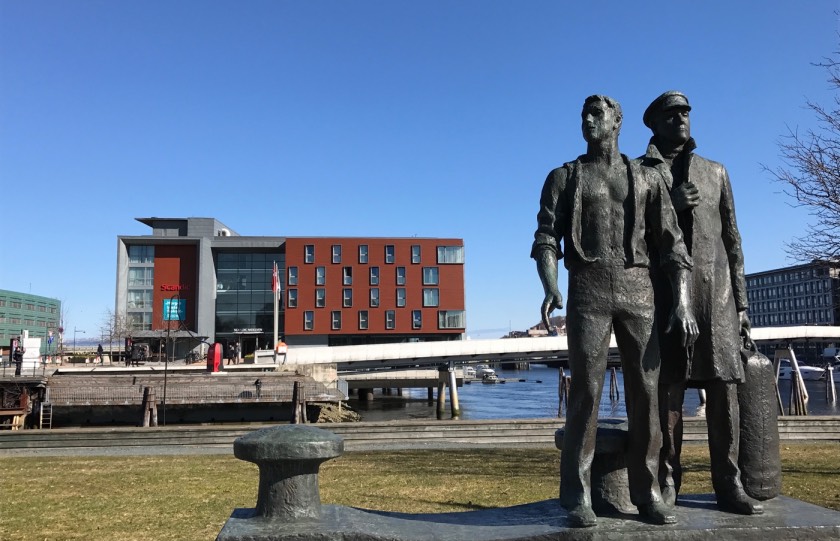
Again, much like visiting the companies in person, it can be a good idea to come up with a few questions about one of their postings and then walk in to ask some questions.
They will definitely look you up in their system, so be sure that your profile is updated and well written.
Create a Norwegian CV & cover letter
Quite basically, Norwegian CVs are different from in the USA, the UK, or many other places.
Speak with a professional if possible about what these should look like and try to look up some examples on the web. Also, when applying, DON’T FORGET THE COVER LETTER!
A résumé without a custom cover letter for exactly that specific position will get your CV deleted almost immediately.

If you can’t take the time to write a cover letter explaining why you are the perfect candidate for the job, you can imagine that an employer will be unlikely to give you their time of day.
Have your documents in order
All employers will want to see copies of your transcripts and references. UDI will expect the original copy of your diploma, resumes, CV, proof of health insurance, and a wide variety of other information that you must ensure you have in order before receiving a visa.
Dress nicely
Trondheim is a small city and it is common to bump into people you know. Many times, I have been invited to a coffee chat on short notice.
By always representing a clean, neat appearance, I made it much easier for people to recommend me to their friends or partners.
During one such meeting, I received some great insight from an employer: “Even though we are just grabbing coffee, I am always thinking to myself: “Can I imagine him sitting in one of my chairs at the office?” If the answer is yes, I am much more likely to refer you.”
Use LinkedIn
LinkedIn is a very useful tool if you use it properly. Create a good profile, add a nice photo, and provide links and information about yourself and your projects.

Make it personalized. Then, start adding contacts. The more contacts you have, the more likely people are to add you because you may be of use to their network.
As an added note, people with the yellow LinkedIn symbol on their profile are called “open networkers” and commonly accept most requests.
These are good people to know because they generally have very large networks. I was able to schedule many coffee chats, practice interviews, and meetings through LinkedIn and eventually landed a job as a direct result.
Go the extra mile
To say that it is difficult to find full-time skilled employment in Norway would be an understatement. This was by far the most difficult job search I have ever been through.
Before landing a job, I met with two US Presidents, was featured in the local Adressa newspaper, spoke at a recruiting event, volunteered countless hours, and submitted more than 50 well-written applications.
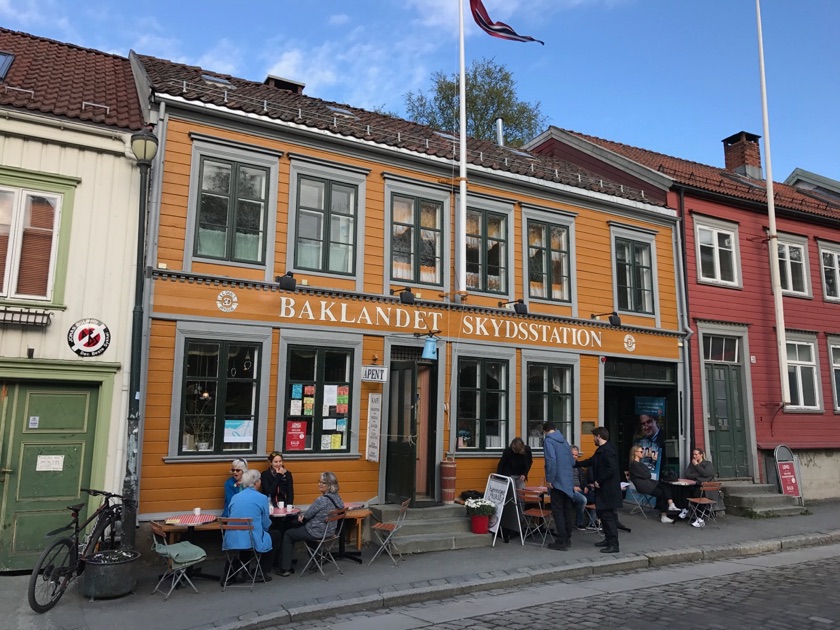
I’m not writing that to brag; I’m writing it because that is what it took before I got my first interview. It is very difficult but the payoff is absolutely worth it.
Conclusion
Trondheim is a networker city and you must meet people in order to get a job. If you are here on a job seeker visa for a limited time, this becomes especially critical.
Work hard, learn quickly, attend events, practice your Norwegian, meet people, apply in person, write well-tailored CVs and Cover Letters, visit DIGS, volunteer as much as possible and NEVER GIVE UP!
If you are an expat looking for work in Trondheim and you have done all of these things, feel free to look me up and we can discuss your job search strategy as well as available resources over coffee.
I’ve been there too and I know how difficult and stressful the process can be.
Lykke til!


Dave – can you tell us a little about which job you got, and how you were the best fit for that position? Your tips are all good (and accurate) but I think it would help other jobseekers if they could see exactly how your strategy paid off. Lack of Norwegian language skills is probably the Number One hurdle for Americans getting a job in Norway, and since you only arrived in December I can only assume your Norwegian is nowhere near fluent. So it would be interesting to hear what kind of employer was willing to overlook that. Thanks!
Hi Geir,
Thanks for your question. I received a job as the Head of Marketing at Dogu (Dogu.no). I was a very good fit for this because of my background in international marketing. Before coming to Norway, I worked in Global Marketing and Branding at the New York Stock Exchange. Dogu’s goal of becoming an international company made me an even more ideal fit. Dogu is a small tech startup, but they are very talented and quite intelligent. So, I certainly am thankful for the opportunity to prove myself and gain experience here in Norway.
You are also correct that lack of Norwegian fluency is a major limiting factor, Although I practice regularly still, Norwegian is not required in the office and they actually do most marketing in both Norwegian and English.
Hope that answers it! Thanks again for asking and let me know if you have any other questions.
After watching Trinny & Susannah oppdrag norge, the voice, stjerne kamp, skavlan and many other English speaking TV shows it’s hard to not admit that the job market is just a tad biased in Trondheim Dave.
It’s a dogmatic demand people have to meet at the moment if they want a slice of the kroner pie, but do you think that demand will survive a recession and the purse strings are much tighter. I know at the moment a lot of talent get’s cast to the wind if they are not fluent in Norwegian, I wonder if that would / will change as the oil decline really begins to take hold.
I’ve been here 4 years and still haven’t got a job and I spoke to someone who took 7 years to get a job. There’s something very wrong here, and unfair is the most polite name I can think of right now.
sorry if I sound a bit “grrrr”…. but you can only take so much rejection before calling it out for what it is.
Thanks for your post.
Thanks David. Your post on your local Trondheim experience would be very profitable for me if I have found it three years ago. It is amazing, that being a ‘former US Marine’ (i.e. a “seal”) which for me means that you have a military training to survive in any situation and location, it took to you 3 years to get a job ……. What should say we, the more ordinary people ? I have got former experience in working in six countries, last 15 years of which I was in the UK, but I was never able to imagine that I will experience such ‘neanderthal’ culture impact on my life as it happened here !
Very useful and interesting points in the article, but I think it’s useful to add that the job search difficulty might depend on the field/profession as well. I think Trondheim has a pretty good IT sector for it’s size, and I know of several companies where English is either the official work language or at least an accepted one, so people coming from a software engineering education might have less trouble.
Norwegian is indeed very important, and was a limiting factor for me as well in my job search. I had about 6 months of experience with the language when I started searching for jobs. I first sent my applications in English, as that’s language I could easily express myself with. At one of the staffing agencies they asked me to try to speak a bit in Norwegian, and they thought it’s good enough to attempt to have a job interview in the language. I had some time to practice before my first interview (you can look up some job interview specific Norwegian lessons like this one: https://www.youtube.com/watch?v=YQQ8S5jwCoI), and even though I struggled/made some mistakes during my interview, I’ve found that Norwegians are very considerate and appreciative of the effort. What I am trying to say is it’s worth to take your chance even if you are not completely fluent yet, it’s a good sign of your dedication and leaves a good impression.
Hi David,
Thank you for sharing the article. It was really interesting having to know your experience. My husband was offered a job in Trondheim as an Engineer and the possibility to get his family with him. I hold a master degree in Foreign Languages and one in Public Administration. I have lots of questions about our future as we are parents of 3 kids and we don’t know if I will be able to get a decent job by the time I am in Trondheim. My husband is currently in Trondheim. We are planning to move by the month of June.
So so so very true 🙂 I was also in Trondheim 3 years ago and encountered the same barriers in getting a job. Finally I gave up and returned home. Still thinking about it…
Thanks for the comment Adriana. That’s a solid testament to how difficult it is to find work in Norway if you don’t speak the language fluently (and sometimes even if you do). If you ever make it back this way, please let us know.
Thank you Dave. Is there a better way to get in touch with you for certain questions ?
Hi,
Trondheim is a very attractive city, so looking for a job there is likely to be a very challenging task. And so it is in all major cities outside Oslo, the capital. Learning the language alone does not always help. Often, there are other factors at play as well, such as simple dress (tribal wear), moderately freindly ways, familiarity etc. People in Norway enjoy equalitarian ways. This implies that casual wear is also a way of getting people to feel comfortable. Wearing ties, blazers or expensive frocks could easily alienate potential acquaintances. Many expats from countries where people are used to dressing up will have to pay heed to this fact.
At many workplaces, it is appropriate to be polite and courteous, but moderation of expression is important. This may especially be confusing for expats from the US, but in the major cities of Norway, people feel overwhelmed when strangers are too open in the beginning. It takes time to get used to this culture where people communicate with strangers mostly during transactions and need time to get used to newcomers. It may be easier to get jobs in smaller cities and villages. So if you are willing to live in a smaller community, you may stand a better chance of getting a job. Generally speaking, it is a bit easier to get jobs in Oslo and its suburbs. There are several international schools in Oslo and Asker as well and transport by train is quite good. Later on, you can even consider moving to another city.
If you have kids attending school in Trondheim, you may choose to find a job in one of the nearby suburbs or islands and find a place to live midway between the school of your kids and your workplace in order to have a shorter distance to travel from home either way. You may also offer to give private tuition in English or some other subject you master while you are looking for jobs.
Good luck!
Anthony
Dave, I honestly admire your way of thinking and sharing great detail experience, It is true the main key to succeed and great chance to find decent job is to learn the language, specially in Norway with it is high stander life style. I believe in our expression saying, learning the language of country your planning to work and live will protect you and will keep out troubles and add to that people will respect you. I finally say good for you Dave and wish you best of the best in your second sweet home country Norway.
Thanks Ahmed! I like it here very much and feel privileged to be working in Trondheim. Still a long way to go with the Norwegian, but learning more daily.
DAVE .can you give some insight of what are the job prospects after doing MS in chemical engineering from NTNU TRONDHEIM?
Born & raised in Trondeim, married an american, now living in CA. I love reading about your experience in Trondheim. Your tenaciousness is paying off. Good luck with the dialects. Try to see how many ways you can say “sulten” in Nord Trøndelag. Then of course it is “klar” which in Trondheim mean you are “sliten”. Heads up, that can get you into trouble.
I’ve been living in Norway for two years now, Married a Norwegian girl back in the UK and we decided to move here with our daughter for various reasons. I thought I could speak quite good Norwegian, until i got here and was immersed. To say people in Trondheim speak a different dialect is a bit of an understatement. The language is quicker, clipped and often the words may be said with a different meaning to what you think they might be. Therefore even knowing Norwegian beforehand, ‘trondisk’ is a notoriously difficult dialect to understand. After two years here i now consider myself able to ‘hold my own’ in a conversation. However I am far from fluent and if the conversation gets too deep or several people are all talking at once I still tend to get lost.
I was very lucky in finding a job, I have many years experience as a bartender and was able to land a job at ‘The Three Lions’ after a week or two of job searching. A traditional English pub right in the heart of the town center. I worked there for a few months until I found my feet and was offered a ‘fast stilling’ job at a kindergarten. I also have a background in Health and social care specialising in behavorial management techniques, so they work quite well together 😀
Hi All,
I wanted to ask you a question which is often asked to me.
I have traveled and worked in a few different countries and that does include Norway.
A common question people ask me is
How much money do you need in order to re-locate for 6 months to Norway in order to give yourself a chance of success?
The answer to that question does depend on a few factors but in general i would say 60,000 nkr should be enough to land, find a room, give yourself time to study the language for 3 months and simultaneously find some work (plus of course live in general).
@Everyone….i would be interested to know what you think?
@Dave – did you stay with your fiance for free??… if yes, this obviously reduces your expenditure but still your thoughts on the money aspect would be appreciated.
Hey Harry,
As you know, Norway is very expensive. It is very difficult to determine how much money a person needs when coming here. That depends primarily on your living situation, I suppose. Transit is relatively expensive but bike/walk is always an option if you’re motivated. Food is also expensive but of course depends on whether you need a hot meal every night or can get by on rice if you must.
To be very straightforward, I lived with my girlfriend at her place and used savings money to cover transit, expenses, and split food. Now that I have a job, I am able to fully split everything.
I would say that Norway in general is very expensive and that NOK 60,000 is probably a good estimate as a minimum.
Hi
iam working in bahrain as a Mechanical Engineer for chillers, basically am into sales for around 8 year of experience. I want work in Norway, am an Indian. Can you help me in finding or guiding me for getting a job here.
Thanks
Saurav
Beware. Salty and lengthily reply ahead.
First of all thanks to all the contributors. As I find myself in a similar situation (relocated for romantic reasons) I know about the struggles of finding a job in Trondheim.
First and foremost it should be pointed out the if you’re applying for a job that requires higher education or in the IT sector things don’t seem so grim since loads of those jobs come with the benefit of an English speaking office. As for engineering jobs they seem to be in free fall since the oil price has fallen below 31$ with a 1 year forecast of 35$ per Barrel.
Let me talk about myself for a second so that you can put my experiences here in perspective. I’m a 30 year old Italian citizen educated in Switzerland. I have a jeurneyman degree (Fagbrev) in office administration and an additional one in customer communication and customer service. My native language is obviously Italian and in addition I speak German and English on a C2 level and Norwegian (Bokmål) on a mediocre B1.
As mentioned in a previous reply I also first applied for jobs in English. Now if that isn’t required in the job profile it’s fair to assume that your CV is gonna end up in a paper bin rather than in a HR department. After switching to a Norwegian CV the experiences were similar (this is an assumption since most of the time you won’t even get a reply). After asking around in my limited social circle (that should be an article all on it’s own. “How to make friends in Norway”. David make it happen! ) I came to believe that your CV, or your qualifications are only part of the answer. Obviously you need the proper qualifications that are required for the job but what determines if you get it is a connection. Someone literally needs to do you a solid and hook you up. (At this point I’d like to point out that my experiences and the believes they led to are entirely my own and do not reflect an absolute truth).
So I started replying for jobs that didn’t match my wishes or qualifications. Cleaning, manual labour in the construction industry, in the fast food business and so on. The outcome was always the same. Crickets and tumbleweed in my inbox.
As for my experiences with the Norwegian employment agencies (NAV) i can only say that Kafka couldn’t have imagined it any better. I gotta come to an end here so let’s see if I can put some sort of conclusion to this.
1. As someone who’s been a foreigner all his life the first thing I’d say is learn the language and learn it properly. Fun fact: official languages in Norway are Bokmål, Nynorsk, Høgnorsk and Sami languages. But no one cares and they rather speak their respective dialects. So many times when they ask you about fluency they do it in their dialect. The irony. Also I made the experience that if you want to succeed you almost need to outperform the locals to be taken serious in a conversation so you should aim for the Bergenstest as soon as possible.
2. Put a maximum effort into networking. Meet people, take classes, offer free labour ideally for a good cause. Become a member of a social club. Whatever leads to a possible recommendation.
3. Employment agencies (Bemanningskontor) should be visited personally. Their online databases equal a data cemetery.
4. Despite the fact that Trondheim is the 3rd most populated municipality it should be approached like I village. The few movers and shakers all know each other and are organized either in the chamber of commerce, social clubs such as the Masonic Lodge or within a university organization. So apply to the uptight dress code and social conventions in Trondheim. And given it’s small population consider moving to Bergen or Oslo.
As for the coat of living I estimate 20.000,- NOK p.p (2068,32,- € or 2265,43,- $ Jan/2016) a month plus extras such as language courses or unforeseen cost factors (the famous washer that breaks down ect.). The number is considerably bigger if you want to eat out, visit theaters and or take place in everything else that is considered being part of socia lifel. As for the lifestyle you can expect remeber that the poverty level is considered below 215,000,- NOK (according to mylittlenorway.com). An example my mother loves is the following. 1kg of chicken (2.2 lb US) costs around 100,- NOK (10,34,- € or 11,33,- $). The prices are reasonably higher in urban areas. (http://enhver.no/priser/)
And now I’m gonna stop myself because everything else I’d like to add would be nothing more than a rant. Good luck to everyone.
I’d say that’s definitely a pretty accurate summary. It’s all about networking. Get out there, volunteer, meet people, apply in-person, anything you can think of. I definitely got very very lucky in my search. Learning Norwegian is also very important but not initially realistic in the job search because it takes many years.
Very nice article Dave, thanks for it 🙂 My situation is a bit similiar to yours as I want to move to Norway because of love 🙂
I am together with my Norwegian boyfriend already 2 years. I am from Poland, Warsaw. We are seeing each other very often and we are planning to settle down in one place.In Poland I work for medical company in back office so very often my boss lets me to take home office and stay in Trondheim. Since a long time I am looking for a job in Trondheim and I can see it may be difficult as mostly offers for foreigners are in Oslo. It’s very brave what you did – coming to Norway with savings and looking for a job there, not remotely. I talked with my boyfreind many times about it – I am scared to quit my job in Warsaw without having a job offer in Trondheim.
Could you please advise where the best is to look for a job in customer service/ administration in Medical industry? I don’t speak Norwegian yet, so would like to get a job with English at the beginning. I don’t know how is in Norway, but for an example at my work in Poland many people don’t speak Polish, we have very multicultural environment. Of course want to learn Norwegian but I know it takes time. I have 10 years of experience in medical industry ( customer service and sales)
Thanks,
Klaudia
Hi Klaudia, thanks for the message. I can’t say for sure but I would imagine that Norwegian is especially important in medical and customer service jobs. I’m sure there are still some that do not require Norwegian, but it may be difficult. The more you can network and meet people while here, the better off you will be. Now is a particularly difficult time for job searching, it seems. Some very qualified people spend years here before finding work.
I’ve sent an email just now to a Polish friend to see if she can provide more help for you. The next time you are in Trondheim, please let me know and we can try to schedule a sit-down chat where I can provide more info.
The last thing I will say is this: ALWAYS follow your heart. It may not be easy but it is definitely worth it for love. Moving here has had some challenging and difficult steps but I would not change it for anything. I love Norway and I love my girlfriend so it is worth it 🙂
I am from Singapore and been here for a year, totally can resonate this.
Anyone has tried the praksis route, language internship aka arbeidstrening arrangement by Nav? My personal experience finds this avenue is pretty useful as in a) widen your network, B) gain local experience and c) practice norwegian.
Hi David,
First of all, I’m glad I found this blog post. Your honesty about your experience in Trondheim/Norway has made me even more determined about my (hopefully) 2-3yr plan.
I’m from Sydney, Australia and I recently went to Norway and Finland. Although I spent only a few weeks, I’ve fallen in love with Scandinavia – the culture, the people, the lifestyle, the landscapes. After returning home in January, my husband and I have decided to try our very best to relocate our lives to Scandinavia – hopefully Norway. Being in our mid-30s, it’s probably going to be slightly difficult.
You are right about one thing – Networking! And the fact that education rates highly on their list. We have made a number of friends in Bergen and Tromso and they too have been giving us a lot of useful tips.
Yours will definitely come in handy as we prepare ourselves as much as we can over the next couple of years. If you can keep pointing me in the right direction (or would love to recommend some contacts 🙂 ), that would be amazing!
Hi Ailene,
Moving to Norway is exceptionally difficult in terms of finding a job at this time. You will also have a limited amount of time to search and apply for work. Check this link and read carefully for more info. https://www.udi.no/en/want-to-apply/work-immigration/
I wish you all of the very best and I’m sure you’re clever enough to sort it somehow… but I promise it is far from easy. Should you ever find yourself in Trondheim, please hit me up and we’ll grab a beer.
Hi David, I am going through the same stage as you went through at the start. I have moved from London to Trondheim, and married my fiance here. Definitely, volunteering is something from which I am learning a lot currently, and I have learnt quite decent Norsk in 4 months time. I am currently struggling with my job search here. I am accountant by profession, and I have no idea about which language they prefer for accountants to know before giving them the job. Let me know if you would like a meet up in a cafe. I am sure I will learn a lot from that experience.
Regards,
Sam
Hi Sam,
As an accountant I would imagine that Norwegian would be very important.
First, most internal government forms will be in Norsk… for taxes, guidance, business and just about anything else I can imagine.
Second, if you have any customer relations duties it will be critical for you to speak fluent Norsk because even though most folks speak English very well, they will of course want to speak about accounting in their native language.
Third, hopefully the good news… anything is possible. So, while the above two may be significant barriers there are also lots of companies who I imagine would like to hire someone who is fluent-native in English if they are doing international work.
So, I can’t say for certain but I imagine you will face significant challenges unless you look specifically at international accounting companies who have a sector specifically for accounting done in English. I’m not sure how many such companies there are in Trondheim specifically as opposed to Oslo.
I’m definitely more than willing to meet up and discuss more in person. Please just leave your email or number in the comments and I will connect with you asap. Or look me up with your Google-Fu skills 😉
Hi David, I’m glad I found this blog post.
I am in trondheim now.
I’m from Beijing, China.My situation is a bit similiar to yours as I moved to Norway because of love.
My wife is studying in NTNU,and I arrived in Trondheim on June 2.
My english is not good,and I can’t speak Norwegian.I have no friends here,but I am eager for making friends with everybody.
I worked in a campany that is about comuunication as a pre-sales technology engineer before I come here.
I am studying english now ,but I find it’s hard to open my mouth to speak it.
I am going to stay here at least 2 years. So I must find a job .
Could you help me ?
Please tell me what should I do now.
Thanks,
Guangru Xue.
Hi Guangru,
I’d love to chat with you about life here in Trondheim. Maybe we can grab a coffee together soon? I’m always up for making new friends too.
Please email me at [email protected] and we’ll set something up.
Hi,
My name is Dulat Yussupaliyev. I am planning to apply for Master degree to Norway, and starting to prepare to it. Hopefully, I would like to go to NTNU)
Is it same difficult to find engineering work in Trondheim as you mentioned before?
I am 5+ year facilities engineer (process, design construction).
Thanks!
Hi, thanks for the comment. Engineering skills are generally needed in Norway and although there are jobs in Trondheim, you should expect to need to broaden your search to Oslo or Stavanger also. NTNU engineering graduates are looked upon highly by industry.
Thank you Mr. Smith, for this excellent article, i am also looking forward to pursue my masters from NTNU which is without doubt one of the finest institute in Norway. Do you think if i do my masters from Norway it would be easier for me to get a job there, instead of doing my masters from my homeland and then goto Trondheim for job hunt?
Another question, have you ever come across any foreign student living in Trondheim? If yes, can you please tell how is life for the foreign students studying in Norway.
Also I highly admire Norwegian culture, and i would love to settle their.
Hi Ashan, I would imagine that if you can get accepted into NTNU, it would be much easier for you to get a job here in Norway. The selection is very competitive so I wish you all the best of luck!
To your second question, there are very many foreign students (and foreign non-students) in Trondheim. The life seems to be very good and from what I have seen, it is pretty easy to make friends if you are outgoing and open. The foreign students I have met like it here very much.
My dream has always been to get to live in Norway. But I really don’t know what I need for this really difficult experience. English is my second language, and seems that it really requires me to speak fluently in Norwegian too if I want to get interview opportunities. Can you please give us some tips to the ones who want to dare and try our luck there?
There is a page full of tips right here 🙂
Thanks for writing this David. I am in a similar situation, my Norwegian wife and I lived and met at the University of Colorado and moved here for her to complete her masters degree. Having just completed my masters degree in civil engineering from CU, I am looking to try and find full time employment here. I am optimistic about living here as climbing, skiing and biking are my passion.
I have always enjoyed volunteering and will definitely look into Gi Bort Dagen, Kosmorama International Film Festival, and TEDx. As an outdoor enthusiast, what was your favorite place to volunteer/ learn Norwegian?
Its funny, I was riding my bike though town and noticed DIGS Cafe seemed very similar to the startup/tech culture I am accustomed to in Boulder. I would love to grab a coffee one day if you are free, although I can see you have plenty of people to get coffee with already!
Cheers,
~Cletus
Hey Cletus, there are some amazing trails around here. We should go for a mountain bike ride or grab a coffee. I’m near Solsiden and you can find my email on the dogu.no webpage. Cheers and welcome to Norway! 🙂
Hello Dave!
I have been reading your blog for some time now, as I am planning to move to Norway in search for better life opportunities. I am a 27 year old Lawyer in Brazil with portuguese Citizenship. I realize being from europe is easier to move through Norway. The thing is, i would rather study a new profession in Norway (enter university again) than being a lawyer. Is it possible to study in norway and make a living while doing so? Are all universities free or are there private ones? Do you think its worth it trying to get regular non skilled jobs there without studying a new course?
I was thinking about moving to trondheim as it seems very appealing, and I am studying norsk (Bokmål) in nearly all my free time (and now i read that the dialect is different there haha).
Thanks for any help you could give me 🙂
Hey Alexei,
You can definitely make a living while studying. Same as anywhere else, I imagine. There are public (free) universities and also private schools.
I don’tm know much about seeking regular non-skilled jobs here but if you have a bachelors degree or equivalent/higher, you can apply for a skilled worker permit.
Check out the web pages for Norwegian universities you’d like to attend and I’m sure you will find tons of useful information! https://en.wikipedia.org/wiki/List_of_universities_in_Norway
Norway is a great place and if you make it to Trondheim, I’d be more than happy to grab coffee and chat more in detail!
Hi, Dave,
Thank you for this article. It describes the reality of job searching not only in Trondheim but also in Norway.
I live in Oslo and have been trying to find a job for over a year now. I thought a master degree from a prestigious university in EU would help me land a job here. How naive 🙂 Luckily, I am married to a Norwegian and have the support I need during these hard times.
I have passed Norskprøve 3 and will try to pass Bergenstest as well. I volunteer. I went directly to Manpower and asked to speak to a recruiter. The response I got was to create a profile and apply online :).
My impression is that many jobs require fluent Norwegian language skills, which often means a mother tongue level. I was even declined a participation in an online job fair and was told that Norwegian companies require at least C1 level.
So, far, I have not heard anything positive regarding the Norwegian job market. Even Norwegians tell me that companies here prefer local graduates and universities and are hardly impressed by a foreign experience.
Despite all this, I try to stay positive and hope that I will eventually find a job here.
Hey VV,
While many countries put great emphasis on the name and prestige of your university, Norway doesn’t care. Here, all that matters is what you studied, what grades you received and what you have to show for skills. I know, it sounds weird because I also went to a big name university in the USA hoping it would help me land jobs at home or abroad… and it is the last thing anyone cares about 🙂
Keep up with the language, but it’s not the most important part. You need to network and meet people. You need to find the jobs that aren’t posted on Finn and then you need a personal recommendation to get a foot in the door. Sounds hard, but if you start making the effort to ease your way into Norway’s inner circles (they’re all inner-circles here), you’ll sort it.
Best of luck! And if you’re looking for more info, check this blog also https://www.lifeinnorway.net/2016/11/jobs-in-norway/
I am a EU citizen trying to move to Trondheim to live with my fiance, and I’m starting to despair. I’m a recent graduate with no experience and only intermediate Norwegian skills. I’ve been here 5 months and although I have been applying everyday and been to countless interviews but still have not broken ground. I am not a social person and struggle with networking and meeting people so it feels pretty hopeless. All I want is to be with my fiance, but circumstances don’t allow him to live outside of Norway so I’m trying my best to move here, but I am really starting to lose heart.
Hey Miriam,
Don’t lose heart. I won’t say that finding a job here will be easy. Nor will I promise that you find that job of your dreams. However, our relationships in life are everything and if there is anything worth fighting for, it’s the people we love. So, keep heart, keep trying and eventually a solution will come about.
Hey Dave, Great write-up. Congrats on living the dream!
I’ve got a quick question for you.
Without going into too much detail, I have:
*USA Humint/Linguistics background.
*Been clinical support staff for an internationally recognized hospital for ~10 years.
*Am currently finishing my undergrad degree, which enables me to pursue the Master’s/License, for [a non-critical-care medical specialty].
*and fwiw, am an ethnic Norwegian-American, like straight up; I have a whole family of brilliant, intractably stubborn, coffee-drinking blonde people lol.
It’s occurring to me that my new 5-8 year plan *could* see me finishing the Master’s/License, gaining exp in the field & transitioning to Norway as a skilled worker, via the professional [cognitive rehabilitation] association (US)->(EU)->(NO).
This all hinges on my ability to learn Norwegian (my 4th language) sufficiently fluently in ~4 years/ASAP. Or maybe it’ll take 10 years. I don’t know.
Here’s my question:
These employment difficulties that everyone is describing having, would I hypothetically be immune from them? Does it seem that, like in America, the medical job market remains strong? Has anything else regarding paperwork really come out of left field?
Thank you,
And I hope everyone gets to where they want to be.
Have a great 2017!
Hey Kevin,
I know that many people face HUGE obstacles in getting Norway to recognize and approve their coursework for nursing or hospital-related work. My advice to you is to VERY carefully study and learn about whether or not your licenses will transfer. You can find some “Americans in Norway” groups on FB and ask some questions there from people who have struggled with this exact thing.
Please heed this advice. Transferring medical licenses to another country, (especially Norway), is VERY difficult. You’ll need to do your homework because it’s case-by-case and I don’t have the answers.
I wish ya the best of luck!
Dave:
Interested how you find the economy to be now, as the oil crisis has hit Norway rather hard.
My background is in finance. Any suggestions on what I can do to make myself marketable over there? My first trip to Norway, and I was hooked. Do not have the chance yet to physically move there yet, but need to begin to network and put feelers out.
Hi Arcady,
Sorry for my late reply on this! The economy here is fine… but jobs are slightly harder to come by these days. I can’t really provide any info if your background is in finance, but perhaps try to connect with someone on a hiring or human resources team at DNB or SpareBank 1 and see if they can help provide tips or guidance?
Hi David,
Thank you for the great post! I plan to attend master’s degree in NTNU this year (the application result will be out in four days), thus I wonder, is it hard to take part time as waitress in the weekend? I am currently self-studying Norwegian, and although my mother tongue is not English, I hold a C1 level (still not C2 tho ??) Anw, I really think socializing and taking part in some volunteering programs will be good for me. I’d love to chat with you, maybe we could grab coffee together, once I arrive in Trondheim?
Hi Azka,
Good luck on your application results! There are quite a few part time jobs for English speakers… but I don’t know about how hard they are to get. If you are accepted to NTNU, there will be PLENTY of programs for you to participate in, socialize, etc.
When you arrive here, please send me an email and we’ll grab coffee. You can find me on the Dogu AS website. 🙂
Hi Dave! How good was to find your blog! Well so I’m in love with a Norwegian guy. I’m from Barcelona so luckily we can travel a lot so we are basically together at least two times every month. I’m going to start my Master in the UK about Lighting design for architecture and led technology. I’m a product designer. After this year (yes I’m going to be studying Norwegian for a year) we are planning to settle down in Oslo as the situation is definitely much better than in Spain and my boyfriend has already a house and job in there.
I’m 24, Do you think that the creative industry like architecture or industrial design have offers? I’t really scares me being well prepared having a degree and a Master in different countries, go there and don’t have a job for 1 year for example and afterwards be excluded from the professional life.
Thank you so much!
Hey Aida, there are plenty of creative and design jobs in Oslo. You’ll just need to find them, apply, and prove you’re the best candidate. If you are truly in LOVE, then it makes sense to try and make it work. With love, all things are possible. So, I wish you luck! 🙂
Hei Hei!
I am moving to Norway in August. I was hoping to have a job lined up when I got there, or to at least have a job by September. Thank you for the tips! Is it possible that we can meet up for coffee in August? I know that is far in advance, but I like to be organized and have some sort of a plan. My boyfriend is from England but works in Norway, so he has tried to teach me a little bit of Norwegian. I spent the last couple of weeks in Norway, it’s refreshing that they speak English!
Hi Amber, yes, we can definitely grab a coffee anytime you are in Trondheim. You can find my email on the Dogu.io webpage under “team”. Wish you luck!!!
Thanks for this article Dave. I married a Norwegian and have spent at least $30k on this move in the past year. I live in Molde and disagree that it’s often better to find jobs in smaller towns. Even my in laws say “people from the EU will get hired first” and they have done very little to help me find a job. And they know everyone here because they have lived here for years. If your CV is not in Norwegian, it will get thrown in the trash. Networking is critical but without fluent Norwegian it’s difficult. We have very few meetup groups here and small towns are vey cliquey and also refugees get hired first, in order to get them off NAV’s payroll. I go to many social events with my family, and I have had friends refer me to jobs but I agree that the best thing to do is go to companies in person and introduce yourself. Also I am 60 and there is higher age discrimination here than in the USA, where it’s already pretty bad. And Norwegians just accept it. I had a career in IT for tweeting years and her in my town all most of the IT folks are young men, and older women aren’t exactly welcome with open arms. So I’m looking at doing an online business or finding a remote job out of the USA where I have the flexibility to be anywhere. People are very nice here, but the attitude is definitely Norway first, EU second, refugees third and anyone else can hope for the best. Americans are generally considered preferable to many other immigrants, but so far it hasn’t helped me find a job.
This is pretty harsh, but probably accurate: “Norway first, EU second, refugees third and anyone else can hope for the best.” – It is much easier in terms of immigration for folks from the EU and NAV does have a commitment to the refugees they bring in. Of course, it depends on what industry you are searching for work in/etc.
It’s not discriminatory by direct intent, but rather just the way things work out sometimes.
I wish you the best of luck!
Hey Dave, I’m a 17 year old American-Egyptian international student at a dorm IB high school in the small city of Finnsnes. I just finished my junior year and am now getting into my senior year; and as far as my Norwegian skills go, I can only talk to bus drivers, supermarket employees and the like for things such as disputing the fact that my voksen busskort is actually an ungdomstotal busskort beltalt på i net. I was wondering, should I continue on to college and university in Norway or is it just not worth the hassle? Do you think having a Norwegian high school and university education will help in a future job search or am I still on the same old job hiring hierarchy?
P.S Most of your advice is to meetup at these events which to be honest, don’t interest me very much and, from my perspective, seem awkward, boring and filled with people who don’t have very developed senses of humor, but maybe that’s just because I’m 17. Thanks for actually writing this by the way.
Hi Harry,
Your question really depends more on your desire to live in Norway than on the “is it worth it to try”. If you really enjoy living here, of course I think it’s worth it to apply to schools here. It will help you in your job search if you stay in Norway, but if you want to return to Egypt, then I suggest getting a college education there. Generally as a rule, it’s smart to attend college where you’d like to find work due to the networking opportunities, name recognition of the school, etc.
PS: Most meetups are boring/awkward and I appreciate your honesty… but they’re still good for meeting people, especially in small towns. From my particular situation, I needed todo everything possible to find a job and the networking from meetups actually proved incredibly valuable later on.
“High standard of living…” may be an over stretched stats. Country/government itself is rich but most people are not. You will see most people eating at Ikea where meals are considered cheaper than other restaurants. And not to mention quality of fast food restaurant, poor at best from menu option to food itself. And dont forget about lack of public toilets in the cities. You have to pay 20 Kr to use one at a fairly large train station, and no water fountain at all anywhere. How is that environment friendly where you are forced to buy bottled water? Lastly, it is mostly closed homogeneous society.
I think it depends on how you define standard of living. As for Ikea, their cafes are packed in every country, not just in Norway… most Norwegians cook and eat meals at home with their family, I would say that’s a good standard of living compared to eating in cheap fast food “restaurants” 🙂
Hey Dave!
So nice to find your article!
I am doing master in NTNU Ålesund in International Business and Marketing. Now, I have only the thesis left, which I plan to do during the next year.
I am moving to Trondheim now in January with my boyfriend. He is Norwegian and I am Brazilian. He moved to Trondheim in August because he started studying in NTNU Dragvoll.
I was thinking on taking this year to learn Norwegian (NTNU only provided my class with the A1 level course) and possibly searching for jobs. You mentioned that the Library provides a Norwegian Course once a week, do you think it is enough? I also taught about taking the course at Folkeuniversitet, but I havent checked the updated prices.
I am also aware of the difficulty of finding jobs, and I reckon that if it takes too long for me to find one, I will start searching for PHD positions too. But I really liked your tips, and I would appreciate if you had more to share!
Regards, Juliana.
Hey Juliana, if you’re in Trondheim, look up my email. It’s pasted above in one of my comments somewhere. We can grab a coffee and it’ll be easier for me to answer your questions.
The library is a good start. Childrens books also help. Duolingo is an app for the phone that has some good exams and is helpful. Also, try speaking norsk only whenever you are with your boyfriend. The courses at Folkeuniversitet are a good option, but a bit expensive.
Hi Dave!
I’m a Brit who will be relocating to Trondheim in May 2019 with my boyfriend (a Trondheim native).
I’m keen to start networking as soon as I arrive (my background lies primarily in marketing and the snowsports industry). Are there any local meetups that you would recommend?
Hey Laura, good luck on your move. If you find my email address above (July 10, 2016), shoot me your resume. Likewise, if you’re up for a short chat when you land.
As for meetups, that depends on what you’re looking to get involved in… as with any other decent sized city, there are plenty of options to include professional, expats, hobbies, etc.
Great article and guide for others
Hi,
My name is Shahroze belongs to non EU country. I am planning to apply for Bachelor degree to Norway, and starting to prepare to it. Hopefully, I would like to go to Nordland University in Stienkjer.
I have an IT backgroung currenlty working as technical lead.(Networrking & camers)
Your blog was very helpfull for me.
After studies I want to settle our here in trondheim.
I am very self motivated and with help of your blog it made me take decision to study and move to trondheim after studies.
Just looking for your suggestions that the decision is good and can be taken or not?
Thanks!
Hei David! Kom over bloggen din ved en tilfeldighet, og ville bare si at du har gjort en god jobb med og beskrive hjembyen min. Godt og lese det gikk bra med jobb søkingen og interessant og lese hvordan du har opplevd byen, folkene og overgangen fra USA til Norge. Hi David! Stubled across your blog by acsident, and I just wanted you to know you have done a good job in describing my hometown of Trondheim. Good to read that it all worked itself out ( because of the effort on your part ofc) on the job front for you. Intresting to read how you have experienced the town, its people and the transison from The US to Norway. Med venlig hilsen/ Best regards Sondre. – ” æ e trønder æ å sjø”
hi
Hi Dave,
Wonderful aricle, Its no surprise for you why I am here. I am working and my wife moved with me but we are from outside EU. She has 4 years international experience from well known internationl companies like Amazon. Its been 6 months yet she has not ended up in a job. She got multiple interviews and even went to final rounds in most cases. But after the final round, most often she get a response saying “you are an amazing candidate and suitable for the position BUT another matchable candidate was selected”. She can speak basic Norwegian too and she is master in Digital marketing. One company actually offer her unpaid internship but then she has to move to another city. Do you think its a wise Idea to start with internship eventhough she has 4 years of experience? She certainly do not want to use her experience for unpaid work but I am advising her to take it. Day by day, its just getting difficult for us to live happily.
Hi Dave,
Very interesting piece, thoughtful and accurate, I expect. I have two degrees (UK) Anthropology & then Law with post-grad Law too. Fully qualified UK lawyer, former partner level. I’ve been a journalist many years including work with UK national broadsheet dailies, BBC radio & TV etc. I currently Edit a leading UK print music magazine. I previously lived around 5 years in Sweden, Vasternorrland, and often visited Trondheim, a lovely city, I agree. I can muddle along in Svenska and therefore understand a little Norska, men bara lite! I’m currently based in SW France and have been granted EU/French residence there but am tempted by a move to Norway. I doubt there is any need for English speaking journalists there, however!, otherwise I’d be off again like a shot! Lycka till!